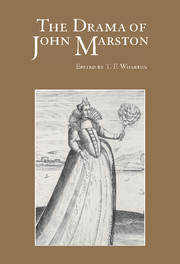Book contents
- Frontmatter
- Contents
- Notes on contributors
- Acknowledgements
- Note on the text
- Introduction
- 1 John Marston at the ‘mart of woe’: the Antonio plays
- 2 John Marston: a theatrical perspective
- 3 Varieties of fantasy in What You Will
- 4 Safety in fiction: Marston's recreational poetics
- 5 Insatiate punning in Marston's courtesan plays
- 6 Touching the self: masturbatory Marston
- 7 ‘Two parts in one’: Marston and masculinity
- 8 The Malcontent: hunting the letter
- 9 The Dutch Courtesan and the profits of translation
- 10 Sexual politics in Marston's The Malcontent
- 11 Marston: censure, censorship, and free speech
- 12 Ill-mannered Marston
- Index
2 - John Marston: a theatrical perspective
Published online by Cambridge University Press: 01 October 2009
- Frontmatter
- Contents
- Notes on contributors
- Acknowledgements
- Note on the text
- Introduction
- 1 John Marston at the ‘mart of woe’: the Antonio plays
- 2 John Marston: a theatrical perspective
- 3 Varieties of fantasy in What You Will
- 4 Safety in fiction: Marston's recreational poetics
- 5 Insatiate punning in Marston's courtesan plays
- 6 Touching the self: masturbatory Marston
- 7 ‘Two parts in one’: Marston and masculinity
- 8 The Malcontent: hunting the letter
- 9 The Dutch Courtesan and the profits of translation
- 10 Sexual politics in Marston's The Malcontent
- 11 Marston: censure, censorship, and free speech
- 12 Ill-mannered Marston
- Index
Summary
As George Whetstone remarks, in the dedicatory epistle to A Mirror for Magistrates, at the Inns of Court, ‘Those that are disposed study laws: who so liketh, without checks, may follow dalliance’ and indeed he was right for ‘attempts to regulate extramural behaviour [at the Inns] ceased altogether during the second half of the sixteenth century and … students were perfectly free to attend plays or sermons as they chose, to drink in taverns … and patronise dicing houses or stewes at their pleasure.’ John Marston was one of those who followed dalliance for, as his father planned to say in his will, ‘my law books … I bequeath them [to him that deserveth them not, that is my wilfull disobedient son, who I think will sell them rather than use them, although I took pains and had delight therein. God bless him and give him true knowledge of himself, and to forgo his delight in plays, vain studies, and fooleries].’ Marston had no love for the law, but he took his ‘fooleries’ seriously. He approached the business of play-writing with an intense interest in the special tastes of his audience, with a precise concern for the actual effect the plays were designed to achieve, and with a detailed appreciation of the potentialities of the playing space available to him. During his career, he wrote for three radically different kinds of market, audience, and theatre building.
- Type
- Chapter
- Information
- The Drama of John MarstonCritical Re-Visions, pp. 27 - 44Publisher: Cambridge University PressPrint publication year: 2001

